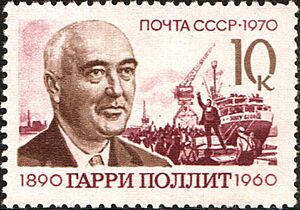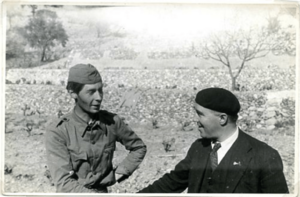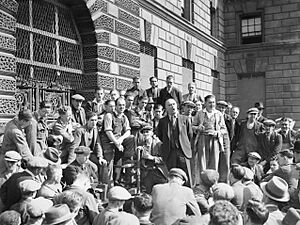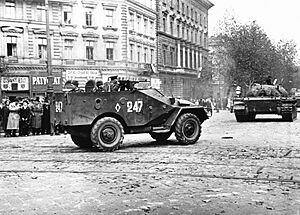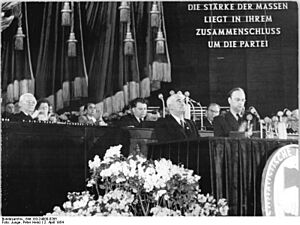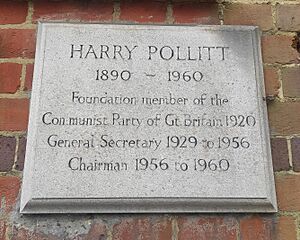Harry Pollitt facts for kids
Quick facts for kids
Harry Pollitt
|
|
|---|---|
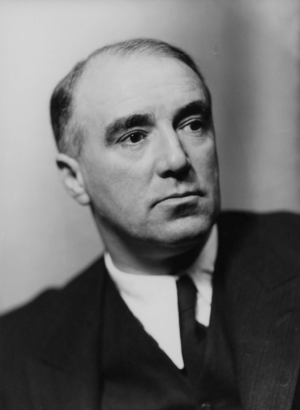
Pollitt in 1934
|
|
| 3rd & 5th General Secretary of the Communist Party of Great Britain | |
| In office June 1941 – 13 May 1956 |
|
| Preceded by | R. Palme Dutt |
| Succeeded by | John Gollan |
| In office July 1929 – 11 October 1939 |
|
| Preceded by | J. R. Campbell |
| Succeeded by | R. Palme Dutt |
| General Secretary of the National Minority Movement | |
| In office 1924–1929 |
|
| Personal details | |
| Born |
Harry Pollitt
22 November 1890 Droylsden, Lancashire, England |
| Died | 27 June 1960 (aged 69) Great Australian Bight, aboard SS Orion |
| Resting place | Golders Green Crematorium, Golders Green, London |
| Political party | Communist Party of Great Britain |
| Other political affiliations |
Workers' Socialist Federation |
| Spouse |
Marjorie Brewer
(m. 1925) |
| Children | 2 |
| Parents | Samuel Pollitt Mary Louisa |
| Signature | |
Harry Pollitt (born 22 November 1890 – died 27 June 1960) was an important British communist leader. He was the General Secretary of the Communist Party of Great Britain (CPGB). He held this role from July 1929 to September 1939, and again from 1941 until his death in 1960.
Pollitt spent most of his life supporting and promoting communism. He followed the ideas of Marxism–Leninism. He especially admired Joseph Stalin, even after Stalin's death. Pollitt was involved in many political events. These included opposing foreign involvement in the Russian Civil War and supporting the Spanish Republicans during the Spanish Civil War. He also supported and later opposed the war against Nazi Germany. He campaigned for a "second front" in World War II. He defended the communist takeover in Czechoslovakia. He also supported the Soviet actions in Hungary in 1956.
He tried to become a member of Parliament many times. He never won, but came very close in 1945. While leading the CPGB, he secretly communicated with Moscow. British security services watched him closely.
Contents
Early Life and Political Beginnings
Childhood and First Jobs
Harry Pollitt was born on 22 November 1890 in Droylsden, Lancashire, England. He was the second of six children. His father, Samuel, was a blacksmith's helper. His mother, Mary Louisa, worked as a cotton spinner. Both of his parents were socialists. His mother later joined the Communist Party of Great Britain when it started in 1920.
Sadly, three of Harry's siblings died when they were babies. The death of his younger sister, Winifred, deeply affected him. Harry started working at age 12, alongside his mother. He saw his mother suffer while working hard. This made him want to fight for better conditions for workers. Later, he became a skilled boilermaker and metal craftsman.
During the First World War, Pollitt did not have to join the army. This was because he had important skills. In 1915, he led a strike in Southampton. He was inspired by the 1917 October Revolution in Russia. He felt it showed that ordinary workers could defeat powerful bosses. By this time, Pollitt was already a member of Sylvia Pankhurst's Workers' Socialist Federation. He was also gaining experience in public speaking.
Becoming a Communist Activist
In September 1919, Pollitt became a full-time organizer. He worked for the "Hands Off Russia" campaign. This group protested against other countries getting involved in the Russian Civil War. Pollitt later went back to working in the Port of London.
There, he helped convince dock workers not to load the ship SS Jolly George in May 1920. This ship was carrying weapons to Poland. At that time, Poland was fighting against Soviet Russia. The dockers refused to load the weapons. The ship's owners had to unload the cargo. The ship then sailed without the weapons.
In August 1920, the Communist Party of Great Britain (CPGB) was formed. It brought together different left-wing groups. Pollitt was a founding member of this new party. The next year, he visited the Soviet Union. During his trip, he met Vladimir Lenin. Pollitt later said this was the greatest day of his life.
In October 1925, Pollitt married Marjorie Brewer. She was a communist schoolteacher. They had a son and a daughter. A week after his wedding, Pollitt was one of 12 Communist Party members who faced legal charges. He was given a 12-month prison sentence for his political activities.
Pollitt traveled to Moscow again in October 1927. He met privately with Joseph Stalin. Stalin told the CPGB to change its strategy. They were to campaign widely in elections. This meant they would even run in areas where they had no chance of winning. This strategy was called "Class-against-Class." It meant attacking other left-wing groups. Pollitt later managed to soften this policy for trade unions.
Pollitt also served as the national secretary of the National Minority Movement (NMM). This group aimed to bring together strong trade unionists. He held this position from 1924 until 1929.
Leading the Communist Party
Before World War II
In 1929, Pollitt was chosen as the General Secretary of the CPGB. Joseph Stalin personally approved this choice. Pollitt saw his role as defending the Communist Party of the Soviet Union (CPSU). He said he would defend it "through thick and thin." Unlike the previous leader, Pollitt was willing to criticize the Labour party.
Pollitt openly showed his loyalty to the Soviet Union and to Stalin. He defended the Moscow Trials. These were trials where Stalin removed his political opponents. In a newspaper article in 1936, Pollitt said these trials were a "new triumph."
In 1935, Pollitt visited Moscow again. He was invited to speak on a BBC radio show. He was going to talk about the differences between the UK and the USSR. However, the invitation was taken back. This was because the Foreign Office did not approve. He did not appear on BBC radio until the 1945 election.
Pollitt had a friend named Rose Cohen. She was a CPGB member. When she faced trial in Moscow in 1937, Pollitt tried to help her privately. However, she had already been executed by then. Questioning her arrest put Pollitt at risk.
Pollitt also went against Moscow's wishes in 1939. He opposed the introduction of conscription (forced military service) in Britain.
Spanish Civil War Support
During the Spanish Civil War (1936–1939), Pollitt visited Spain five times. Each time, he gave speeches to the British Battalion. This group was part of the International Brigades. They supported the Republican side in the war. Pollitt also helped decide which British volunteers could join these brigades. He also wrote letters to the families of British communists who died in Spain.
Secret Communications and Monitoring
From 1933 to 1939, Pollitt used a secret radio code to talk with Moscow. This contact stopped when he resigned as leader. But it was started again in 1941.
British security services, like MI5, watched CPGB members. This included Harry Pollitt. They even placed a listening device in their offices in 1942. They also had sources who reported on Pollitt's activities.
Through intercepted messages, it was known that the Comintern (the international communist organization in Moscow) closely guided the CPGB. They also provided a lot of money to the CPGB. Pollitt often asked Moscow for more funding. In one message, Pollitt complained about a trip to France. He said he went to speak for the French Communist Party. But he was not allowed to speak, which he called a "scandal."
World War II and Changing Stances
When Britain declared war on Nazi Germany in September 1939, Pollitt initially supported it. He called for a "struggle on two fronts." This meant fighting Hitler and also fighting Chamberlain's government. However, this view went against the instructions from Moscow. So, Pollitt was forced to resign as leader. By November 1939, he changed his mind. He said that supporting the war had "played into the hands of the class enemy."
From 1940 to 1941, the party followed a policy called "revolutionary defeatism." This meant they believed that Britain's defeat in the war could help achieve communist goals faster. Pollitt criticized the government's war policies. He said they were trying to use the war to bring fascism to workers.
In 1941, Germany invaded the Soviet Union. Because of this, Pollitt was put back as the leader of the CPGB. This was also based on instructions from Moscow. Moscow now wanted full support for the Churchill government. They wanted to avoid angering anti-socialist opinions.
After the Soviet Union was invaded, Pollitt strongly supported opening a "second front" in Europe. This meant the Western Allies should attack Nazi Germany from another side. Pollitt also urged Jawaharlal Nehru to delay demands for Indian independence during the war. Pollitt was against strikes during the war. He felt they would harm the war effort.
In May 1943, the Comintern was dissolved. Pollitt used this chance to try again to join the Labour Party. However, Labour's committee rejected this. They again mentioned the CPGB's earlier opposition to the war. In the 1945 general election, the CPGB tried to work with the Labour Party. But Labour did not agree. As a result, the CPGB only put up candidates in 21 areas. Only two of them won.
After World War II
Pollitt supported the communist takeover in Czechoslovakia in 1948. He said it was the work of ordinary people. He also criticized the Marshall Plan. He called it a war plan. He wanted Ernest Bevin, the Foreign Secretary, to be removed.
In 1951, the CPGB adopted a new plan called The British Road To Socialism. This plan said the CPGB would be independent from Moscow. It also said they would try to gain power through elections, not revolution. It claimed decisions would be made democratically within the party. However, Stalin had actually dictated this plan to Pollitt in secret meetings.
When Joseph Stalin died, Pollitt wrote that he was "the greatest man of our time." He said there had never been "such universal grief." Pollitt was also part of the guard of honor at Stalin's funeral.
The new Soviet leader, Nikita Khrushchev, caused problems for the CPGB. Khrushchev criticized Stalin's actions in a secret speech in 1956. This was embarrassing for Pollitt. He had been in Moscow for the meeting but was not allowed to hear the speech.
Pollitt's health was getting worse. He resigned as General Secretary in May 1956. John Gollan took over. Pollitt became the CP Chairman. When Khrushchev's criticism of Stalin became public, Pollitt said he was "too old to go into reverse." He refused to take down a portrait of Stalin in his living room. He said, "He's staying there as long as I'm alive."
The Soviet Union's actions in the Hungarian Revolution of 1956 made things worse for the CPGB. Pollitt supported the Soviet invasion of Hungary. He said it had "saved Hungary from fascism." Many party members resigned because of this.
In 1959, Pollitt helped British communist journalist Alan Winnington. Winnington was unhappy with Chinese politics. Pollitt arranged for him to move to East Germany. Winnington was very thankful. After Pollitt's death, he called him "the greatest Englishman I have known."
Electoral Attempts
Harry Pollitt tried to win a seat in Parliament many times. But he never succeeded.
- In 1929, he ran in Durham, Seaham. He got 1,431 votes.
- In 1930, he ran in Stepney, Whitechapel, and St. George's in London. He got 2,106 votes. He ran there again in 1931 and got 2,658 votes.
- In 1933, he ran in Derbyshire, Clay Cross. He received 3,434 votes.
- In a 1940 special election in Silvertown, he got 966 votes.
He ran three times in Rhondda East in South Wales:
- In 1935, he lost to the Labour candidate by over 8,000 votes.
- In the 1945 general election, he came very close to winning. He got 15,761 votes. This was less than a thousand votes behind the Labour candidate.
- In 1950, he lost by a large margin, getting only 4,463 votes.
Death and Lasting Impact
After years of poor health, Harry Pollitt died at age 69. He suffered a stroke while returning from a speaking tour in Australia. This happened on 27 June 1960, aboard the SS Orion.
He was cremated in Golders Green on 9 July. He left behind his wife, Marjorie, and their two children, Brian and Jean.
The People's History Museum in Manchester keeps many of Pollitt's papers. These documents cover his life from 1920 to 1960.
In 1971, a Soviet merchant ship was named after Pollitt. It was later renamed and scrapped. A plaque honoring Pollitt was put up in Droylsden in 1995. He is also remembered in a song called "The Ballad of Harry Pollitt." This song was written during his lifetime.
 | Jackie Robinson |
 | Jack Johnson |
 | Althea Gibson |
 | Arthur Ashe |
 | Muhammad Ali |


